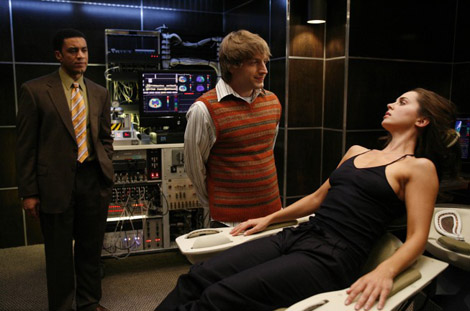For God’s sake don’t make me watch any more.
We’re doing a Joss Whedon roundtable hopefully week after next. In preparation, I thought I would watch Dollhouse…but it’s so crappy I don’t think I’ll actually make it all the way through. I like Eliza Dushku; she’s charming, if not exactly talented. But charm can only take you so far.
Anyway, what’s interesting to me in the first few episodes is how they work as self-parody of television writ large. Echo (that’s Dushku) is a mind-wiped young woman who gets some new personality transferred into her in each episode, at the behest of some paying client who wants a customized toy human to play with. Each of the scenarios is basically a clichéd and indifferently realized genre exercise: Echo becomes a profiler and deals with kidnappers; echo goes into the woods with an outdoorsman and then it turns out he’s a psychopath and she’s in a slasher movie; Echo is programmed as a swaggering art thief in a caper gone wrong. The blips in echo’s program function as a kind of wink at televisions myriad plot-holes. In one episode Echo is programmed to protect a pop singer, and keeps protecting her because the programming/plot demands that she should, even when, as far as character consistency goes, it makes no sense. In that art thief ep, Echo is mind-wiped half way through, becoming completely useless—echoing, again, the erratic competence of tv characters, who are as hapless or as effective as the plot requires. The fact that Dollhouse is itself wretched television only makes its meta-commentary on the wretchedness of television more perfect. It is itself the slipshod awfulness it mimics; Whedon is a fool performing a perfectly brainless imitation of a fool.
Dollhouse isn’t just a parody of television, though; it’s a parody of Whedon himself—and particularly of his feminism. Each of the personalities injected into Echo is resourceful, intelligent, determined. They’re strong female characters all. But they’re strong female characters that are made up, and visibly hollow. More, they’re strong female characters who just about all seem designed to be raped. Echo is often programmed to have romantic and sexual encounters—and such encounters are of course not consented to by Echo’s original personality, wherever that may be. For that matter, the insertion of the personalities into a unwitting body is itself a kind of assault. The creation of strong female characters is conflated with skeevy, snickering, and generally horrible abuse. This juxtaposition fits rather too neatly onto, for example, Buffy, where the strong female lead is frequently punished and shamed for her strength, almost as if the whole point of creating strong women is to run them through a sadomasochistic fever dream.
I only made it through episode 5, and in theory 6 is where things start to somewhat improve. I don’t know if I’ll ever get there…but I guess I do grudgingly admire the start of the series for its unremittingly self-accusatory awfulness. It’s hard to think of another series that so self-consciously uses its own crappiness to indict its medium and its creator.

